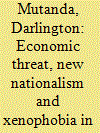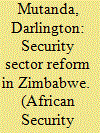|
|
|
Sort Order |
|
|
|
Items / Page
|
|
|
|
|
|
|
| Srl | Item |
| 1 |
ID:
187342


|
|
|
|
|
| Summary/Abstract |
The perceived economic threat has given rise to narrow nationalism in South Africa, which has given birth to direct, cultural and structural forms of violence, commonly referred to as xenophobia, which is actually Afrophobia. The main argument is that in as much as there is evidence of the influx of mainly African migrants in South Africa, and these have been largely accused of various crimes and contributing to rising unemployment, this perception trivialises the need for a multipronged and people-centred approach to South Africa’s and Africa’s underlying domestic challenges. Xenophobia should not be seen as only a South African but also an Africa problem, which consequently requires a national and continental response strategy. This then implies that South Africa has a role in stemming the challenges that have given impetus to a new form of narrow nationalism. On the other hand, the article attempts to explain what a continental response strategy might entail. In fact, the narratives of African migrants as pervasive criminals and job snatchers conveniently relieves the post-apartheid government which is expected to enhance service delivery and create opportunities for the locals, as well as giving dignity to the immigrants.
|
|
|
|
|
|
|
|
|
|
|
|
|
|
|
|
| 2 |
ID:
170256


|
|
|
|
|
| Summary/Abstract |
Studies on security sector reform in Zimbabwe have largely taken the radical view that more often than not, the military has acted undemocratically through uttering and overseeing an array of operations meant to stifle democracy. Using document analysis, this article argues that police reform in Zimbabwe is imperative in ensuring the safety of the citizens who have since 1980 fallen victim to police unprofessionalism. There is sufficient evidence to suggest that any insightful discussion on security sector reform in Zimbabwe should take into account the role police have occupied in propping up ZANU PF since independence in 1980. Notwithstanding the volatile political environment that prevailed, it is the argument of this paper that the police were central to the survival of ZANU PF through the systematic execution of violence against the opposition; ignoring cases of political violence brought to them or even the ones they witnessed; carrying out politically-motivated arrests and dismissing alleged anti-ZANU PF police officers. It is therefore significant for Zimbabwe to speed up efforts to train and equip the police force with the requisite skills and weaponry so that they execute their duties within the confines of the country’s constitution.
|
|
|
|
|
|
|
|
|
|
|
|
|
|
|
|
| 3 |
ID:
142512


|
|
|
|
|
| Summary/Abstract |
The 21st century witnessed a wave of uprisings code-named the Arab Spring that resulted in the fall of Ben Ali, Gaddafi, and Mubarak. Indeed, the ‘mother’ of the Arab Spring was in Syria where efforts to oust Assad claimed an enormous but predictable toll on human lives and immeasurable infrastructural obliteration. The United States and Russia gathered considerable allies behind them to fight for regional dominance in a Cold War style. This article argues that, in spite of pitting superpowers, the Syrian conflict deeply divided the Arab World with no solution in sight. The article further notes that, while serious damage was done to the country, peace-making in Syria needed a compromise to be struck by Moscow and Washington, considering their active role in the conflict. The conflict further deepened sectarian violence in the region as the conflict spread to Syria’s neighbors, such as Israel, Jordan, Iraq, Lebanon, and Turkey.
|
|
|
|
|
|
|
|
|
|
|
|
|
|
|
|
|
|
|
|
|